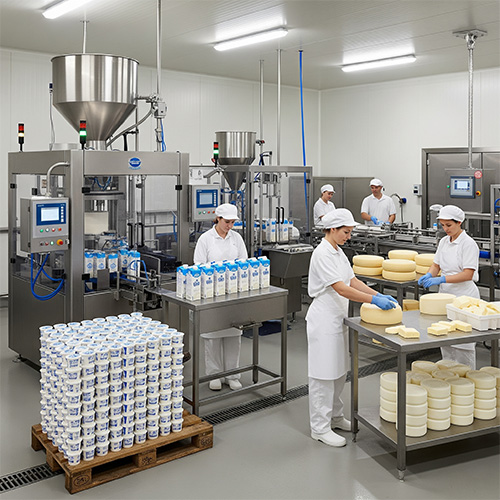

In order to preserve the highest standards of hygiene, safety, and quality in the dairy industry, it is imperative to sterilize the process area and dairy products. Dairy products, including milk, cheese, butter, and yogurt, are susceptible to contamination if not handled appropriately. Additionally, the process area, which is the location where these products are manufactured and processed, must be maintained in a state of complete cleanliness and free of any hazardous microorganisms. This guarantees that the products are safe for consumption and have a prolonged shelf life.
Regular sterilization also helps in reducing the risk of equipment-related contamination, which can affect entire production batches. It minimizes product recalls, improves overall efficiency, and ensures that strict food safety standards are met at every stage of processing.
In layman's terms, the sterilization of dairy products and process areas involves the elimination of bacteria, viruses, fungi, and other harmful organisms that have the potential to disrupt the products or pose health risks. This is accomplished through the utilization of sophisticated apparatus and methods, including chemical sanitizers, heat sterilization, and ozone generators. For example, ozone is a highly effective and environmentally favourable alternative that is extensively employed in the dairy sector. It is particularly well-suited for food production areas because it not only eliminates germs but also leaves no hazardous residue.
We cannot exaggerate the significance of sterilizing the process area and dairy products. Raw materials, equipment, and surfaces are perpetually exposed to contaminants in a bustling dairy plant. Foodborne illnesses can result from the rapid transmission of harmful bacteria such as Salmonella, Listeria, or E. coli in the absence of appropriate sterilization. Manufacturers guarantee that consumers receive high-quality, safe products by meticulously sterilizing the process area and dairy products.
Sterilization is also instrumental in increasing productivity and decreasing waste. Contamination can result in the spoilage of product batches, which is not only a loss for the manufacturer but also a squandering of valuable resources. The risk of such incidents is significantly reduced when the process area is sterilized properly, thereby guaranteeing consistent production and seamless operations.

Conventional disinfectants like chlorine or quaternary ammonium compounds have long been used for process area and dairy sanitization. But in recent years, OZONE(O3) has presented a new, smart and eco-friendly option for this job. What makes ozone different from traditional options for sanitizing:
Furthermore, dairy businesses are able to adhere to stringent health and safety regulations by sterilizing their process areas and dairy products. Stringent food safety regulations are implemented by governments and health authorities worldwide. By investing in dependable sterilization methods, businesses can establish trust with their consumers, avoid penalties, and adhere to these standards.